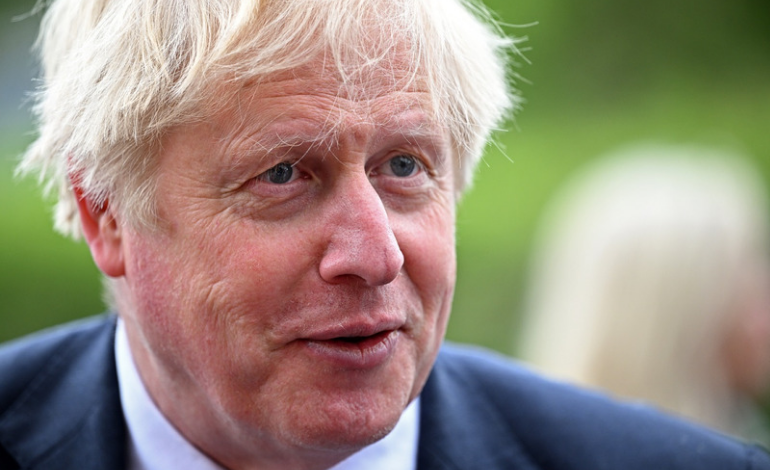Prime Minister Boris Johnson reiterated British threats to breach a Brexit dealwith the European Union on Monday, blaming it for a political crisis in Northern Ireland that is preventing the formation of a new government

If the EU does not agree to modify post-Brexit trade regulations that he claims are upsetting Northern Ireland's delicate political balance, Johnson said there will be "a necessity to intervene."
Johnson spoke privately with the leaders of Northern Ireland's major political parties, pushing them to resume their work.
His public message, though, was directed at the EU's 27 member states, whom he accused of refusing to budge on post-Brexit border checks.
"I'm hoping the EU's stance changes. If it doesn't, action will be required," Johnson wrote in the Belfast Telegraph.
The government is scheduled to lay out proposed legislation on Tuesday that would allow Britain to override portions of the EU's Brexit accord.
Ireland, an EU member, cautioned that a unilateral move by Britain may jeopardise the entire post-
Brexit trade pact that the UK and the bloc hammered out in months of tense negotiations before the UK's 2020 leave.
Britain's stance, according to Irish Foreign Minister Simon Coveney, "calls intoquestion the functioning of the TCA" — the UK-EU trade and cooperation agreement.
Northern Ireland's new Assembly was elected earlier this month, with the Irish nationalist party Sinn Fein winning the most seats.
It was the first time in Northern Ireland, a stronghold of Protestant unionist authority, that a party seeking union with the Republic of Ireland won an election
The Democratic Unionist Party, which came in second, has refused to form a government or even allow the assembly to meet until Johnson's government eliminates post-Brexit inspections on goods entering Northern Ireland from the rest of the UK.
A government cannot be formed without the support of both nationalist and unionist parties, according to power-sharing principles established as part of Northern Ireland's peace process.
Northern Ireland is the only part of the United Kingdom with an EU border.
When the United Kingdom left the EU and its borderless free-trade zone, a deal was struck to preserve the Irish land border free of customs posts and other checks, as an open border was a fundamental pillar of the peace process that ended decades of conflict in Northern Ireland.
Instead, some commodities entering Northern Ireland from the rest of the UK are subject to inspection, such as meat and eggs.
Unionists in Northern Ireland oppose the agreement, claiming that the new checks tax businesses and sever ties between Northern Ireland and the rest of the United Kingdom.
The limitations, known as the NorthernIreland Protocol, are destabilising a peace agreement that relies on backing from both Protestant unionists and Catholic nationalists, according to the British government.
"After meeting with Johnson on Monday, the DUP has a mandate to see the Protocol replaced with measures that restore our role inside the UK internal market," party leader Jeffrey Donaldson said. "Our authority will be upheld."
Although the EU claims that the treaty cannot be renegotiated, it is willing to be flexible in order to reduce the burden of checks.
Johnson, on the other hand, charged the EU of failing to acknowledge that the current arrangements are ineffective.
Johnson said following his meetings with the parties at Hillsborough Castle outside Belfast, "We don't want to scrap it, but we think it can be mended."
He stated that he would prefer to do so through negotiations with the EU, butthat "in order to have the insurance, wemust also go with a legislative solution."
Mary Lou McDonald, the leader of SinnFein, accused the British government of "cynical shenanigans" and "placing the DUP."
She said the British government's proposal to legislation to break the law by overriding the Brexit accord "sounds completely strange to us."
Although new law would take months to pass through Parliament, the unilateral step would enrage the EU, which would respond with legal action – and maybe trade sanctions.
Even after Brexit, the EU remains Britain's largest trading partner.
Micheal Martin, the Irish Prime Minister, stated he met with EU Council President Charles Michel and they "agreed that the best way to settle this issue is through substantial talks between the European Union and the United Kingdom government."
As Europe seeks unity in reaction to Russia's invasion of Ukraine, Coveney said a rivalry between the UK and the EU "is the last thing Europe needs right now."
"This is a time for calm," Coveney remarked during a Brussels gathering of EU foreign ministers. "Now is the moment for discussion."
It is now time for the EU and the UK to work together to resolve these outstanding difficulties."